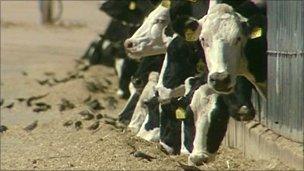Mega-dairy plans divide Nocton villagers
- Published
Norm Dinis explains why his farm milks 5,000 dairy cattle every day
As the final preparations are made to a planning application to build Europe's biggest dairy farm in Lincolnshire, the BBC's rural affairs correspondent Jeremy Cook investigates how mega-dairy farms, commonplace in the US, could revolutionise British agriculture.
A couple of hours' drive from Denver, in the flat arable land of the Colorado farm belt, is a sight which in America is wholly unremarkable, but in the UK would be unprecedented.
From a distance the Empire Dairy resembles a big warehouse complex, its vast expanse of metal roofing shining in the Colorado sun.
But, get a little closer and you realise that these are not industrial units, but huge, open-sided cattle sheds - home to some 10,000 cattle.
It's all very different to our traditional British idea of what makes a dairy farm.
'Giant sheds'
In the UK the average herd size is something like 100.
The cows are kept outside to graze in fields as long as the grass is growing. Only in the winter, are they brought into sheds for shelter and food.
On this mega American farm it is a different ball game.
The cattle here never see a field. Rather, they are housed in these giant sheds with large exercise yards outside. The food from the thousands of acres of farmland surrounding the unit is brought from the fields to the cattle.
Plans to create a similar dairy near the Lincolnshire village of Nocton have met with fierce opposition. Local people say they're worried about the visual impact, the smell, pollution, noise and traffic. Animal welfare campaigners say mega farms are unnatural and cruel.
But in Colorado Norm Dinis says he is proud of the business which his father created, and which he continues to expand.
And he rejects any notion that this is a "factory" farm.
"'Factories' is a term used by those that don't approve of what we do... they love to label us.
"By no means are we a factory. In our business a happy cow is a profitable cow. Some would take offence when I use 'profitable' and 'animal' in the same sentence but 'happy' is also in there and these are animals that are well fed and well maintained and we do everything we can to keep them as healthy as we can."
The heart of the dairy is the milking parlour and the cows know the drill.
Without any fuss, 60 at a time stroll down the row of milking stations to take their place.
The automated barriers lock them in and the Mexican workers apply the suction tubes to their udders.
Serious challenges
But this is milk production on a grand scale. Running 24 hours a day, seven days a week, each of the 5,000 in the herd will pass through here three times in 24 hours, producing 190,000 litres (41794 gallons) of milk a day.
It is this economy of scale that farmer Peter Willes wants to emulate in the heart of arable Lincolnshire.

Not everybody in Nocton wants the dairy farm to be built
Standing on the edge of a windswept barren field he sketches out his vision for a revolution in British dairy production. Four open-sided barns housing 8,000 cows milked - like their American counterparts - 24/7 in an automated wheel-shaped rotating milking parlour.
A West Country dairy farmer for 30 years, he fears for the future of his profession and believes they have no choice - improve efficiency or die out.
"Our industry has been under serious challenges for the last 10 years.
"We are losing two dairy farmers every day. Fifty per cent of our farmers have gone out of the industry over the decade.
"If we don't reinvest in our industry we will be desperately short of British milk, and we think that is a shame," he said.
But his neighbour, arable farmer Peter Lundgren disagrees.
"I think we need to talk about what is efficient. If efficient is producing milk to the lowest unit cost then this is efficient, but I would argue farming should be more than that," he said.
And he is not alone. An initial planning application for the dairy drew a storm of protests from local residents, who fear such a large unit will have a significant impact on their quiet villages. It was withdrawn in April.
Animal rights groups insist that the mega farm is a massive welfare issue.
As Mr Willes and his business partners prepare to re-submit their application in the next few weeks, all sides accept that this is a test case.
If the project gets the go ahead, then expect to see more in the months and years to come.
- Published10 August 2010